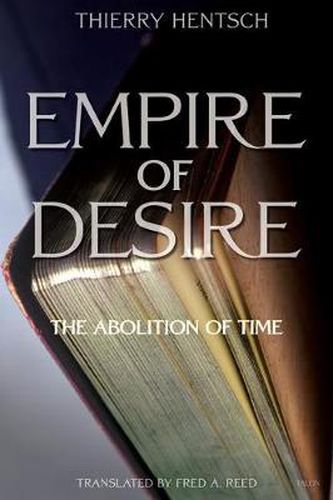Readings Newsletter
Become a Readings Member to make your shopping experience even easier.
Sign in or sign up for free!
You’re not far away from qualifying for FREE standard shipping within Australia
You’ve qualified for FREE standard shipping within Australia
The cart is loading…






Empire of Desire, the second volume of Thierry Hentsch’s epic survey of the formative texts of the Western narrative tradition, completes the work he began in the first: Truth or Death. It traces western civilization’s quest for immortality across a further four centuries-from Moliere to Proust, by way of Voltaire and Rousseau, Goethe and Hegel, Melville and Joyce-ending in 1922, coincidentally the year Ulysses was published and Marcel Proust breathed his last. Truth or Death had revealed how the Biblical imperative of salvation gradually and systematically transferred the quest for immortality from the religious to the profane, as technoscience came to supplant God in the age of reason.
Now, in Empire of Desire, Thierry Hentsch presents modern man -freed from the imperative of transcendence-as a creature who desires to desire, moving without cease from one object to another, in a state of self-imposed oblivion, the Western narrative tradition reaching its apotheosis with the work of Marcel Proust, in whose exquisitely crafted prose, desire has become the artist’s instrument of choice-the vivisectionist’s scalpel. Thierry Hentsch’s untimely death in 2005 has left us, as his generous bequest, a vivid, multi-faceted literary testament. Proust, foreshadowing the title of the mortal bargain, Raconter et Mourir -to tell the tale, and to die-brings Hentsch’s reading of the Western literary tradition full circle. Proust, in whose company despair can find no finger-hold, in whose company I learn with every passing day that literature is nothing more than life reflected upon, recaptured; that it is the expression-an expression that takes one’s breath away-of those simple instants that poets have sought after since time out of mind, and whose fleeting yet powerful pleasure give us, for a spark of eternity, the feeling that we ourselves partake of the abolition of time.
$9.00 standard shipping within Australia
FREE standard shipping within Australia for orders over $100.00
Express & International shipping calculated at checkout
Empire of Desire, the second volume of Thierry Hentsch’s epic survey of the formative texts of the Western narrative tradition, completes the work he began in the first: Truth or Death. It traces western civilization’s quest for immortality across a further four centuries-from Moliere to Proust, by way of Voltaire and Rousseau, Goethe and Hegel, Melville and Joyce-ending in 1922, coincidentally the year Ulysses was published and Marcel Proust breathed his last. Truth or Death had revealed how the Biblical imperative of salvation gradually and systematically transferred the quest for immortality from the religious to the profane, as technoscience came to supplant God in the age of reason.
Now, in Empire of Desire, Thierry Hentsch presents modern man -freed from the imperative of transcendence-as a creature who desires to desire, moving without cease from one object to another, in a state of self-imposed oblivion, the Western narrative tradition reaching its apotheosis with the work of Marcel Proust, in whose exquisitely crafted prose, desire has become the artist’s instrument of choice-the vivisectionist’s scalpel. Thierry Hentsch’s untimely death in 2005 has left us, as his generous bequest, a vivid, multi-faceted literary testament. Proust, foreshadowing the title of the mortal bargain, Raconter et Mourir -to tell the tale, and to die-brings Hentsch’s reading of the Western literary tradition full circle. Proust, in whose company despair can find no finger-hold, in whose company I learn with every passing day that literature is nothing more than life reflected upon, recaptured; that it is the expression-an expression that takes one’s breath away-of those simple instants that poets have sought after since time out of mind, and whose fleeting yet powerful pleasure give us, for a spark of eternity, the feeling that we ourselves partake of the abolition of time.